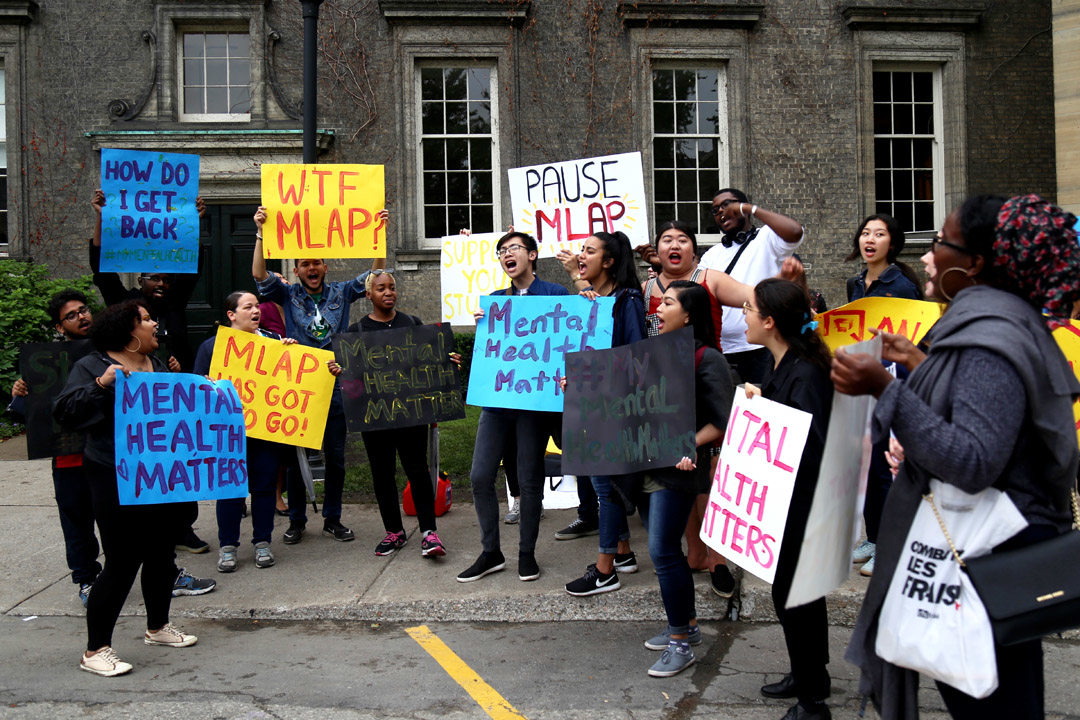On November 16, Sandy Welsh, vice-provost students; Donald Ainslie, philosophy professor; and Varsha Patel, UTSC assistant dean student success and career support, presented the preliminary review of the University-Mandated Leave of Absence Policy (UMLAP) to the UTM Campus Council with preliminary recommendations for changes to the policy. The recommendations are not final, and they will be presented at forums on campus as the review of the policy continues.
The UMLAP is a policy that allows the university to place students it deems to be a danger to themselves or others on a mandated leave of absence from their studies. It was approved by the Governing Council in June 2018 after a significant consultation process that considered feedback from students, staff, faculty, external experts in mental health and human rights law and the Ontario Human Rights Commission, and has been controversial since it was established. It is currently undergoing a scheduled review.
Ainslie presented the policy at the meeting. He admitted that it is a “little complex,” and said that the review is aimed toward clarifying the purpose of the policy.
The reviewers recommended keeping a version of the policy, but changing its name, clarifying its use, and restricting its scope to only students that pose a harm to others. They further recommended that additional data be provided on the policy beyond the number of students who have been put on leave. This data would include demographics and timelines for those on leave.
Preliminary recommendations
In the preliminary recommendations, reviewers suggested that the university maintain a revised version of the policy with a new name that would “more accurately reflect its purpose.” They also recommended that the policy be restricted to use when a student poses a risk of harm to others and is “actively interfering with the educational experience of fellow students,” and all other methods for accommodating their needs have been exhausted.
Currently, data on the number of students who have been put on mandated leave is available on U of T’s website. In the 2020–2021 year, four students were put on mandated leave. The recommendations suggest that additional data on the demographics of those who are put on leave be made available, as well as the corresponding timelines of their leave.
The preliminary recommendations also advised setting up further support for students, such as creating voluntary leave policies for divisions that don’t already have them and providing more support in situations when a divisional voluntary leave policy has not been successful.
The consultation process for the policy will remain open until November 30 and an additional review is recommended to be held in three years to reevaluate the policy.
Background on the review
The aim of the policy is for the university to collaborate with the student to find appropriate accommodations and help them meet their academic goals. “But sometimes, despite the best efforts of all concerned, this student refuses to propose accommodations, or the accommodations are not sufficient to address the concerning behavior,” Ainslie said.
At that point, the student in question has the option to go on a voluntary leave to focus on their health, but if their behavior continues to meet the criteria set in the policies and they refuse to go on a voluntary leave, the university — after consulting with health professionals — may mandate the student to go on leave.
“The policy was inhibiting students from seeking help for fear that they would then be considered for a mandated leave, and that’s the last thing the university wants,” Ainslie said. He added that students don’t have a clear perspective of what the policy does, especially in regard to their study visas, finances, and housing.
The university meant to release a companion guide to the policy in the fall, but the guide still has not been released. “In terms of what we heard from faculty and staff, there was some agreement with the student concerns, especially the need for a companion guide, so that staff and faculty understand the policy better,” said Ainslie.
Reviewers emphasized in the meeting that an individual’s discomfort with a students’ mental health is not a proper reason to put a student on leave. Ainslie said that it is necessary to get more data on how the policy is being used for a better understanding and to ensure that the policy is being used in the initial purpose and is not targeting marginalized students. The review also considers any unintended outcomes of the policy, such as its impacts on students’ access to mental health services and accommodations, evaluation of the annual reporting on it, and periodic review requirements.


